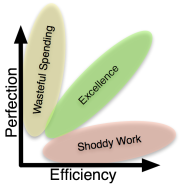Are you planning on introducing change within your organization? Change can be: new business processes, new workflows, new organization structure, new technologies, new culture. It can be all, a mix of some of those or even only one of them. In any case it is a change and has to be managed properly to achieve its objectives.
To manage change  in your organization you need two people working coherently to achieve the organizational targets; a Projects Manager and a Change Manager. The Projects manager will focus on all the technicalities, operations and details of the change, while the Change Manager will focus on the Human aspects of the change.
in your organization you need two people working coherently to achieve the organizational targets; a Projects Manager and a Change Manager. The Projects manager will focus on all the technicalities, operations and details of the change, while the Change Manager will focus on the Human aspects of the change.
I’ll focus here on the Human aspects. Upon introducing change you need to make sure to attend to every point in this list:
1- Know for yourself first as a decision maker why the organization needs this change. Change has to be for the development and moving forward reasons, so if the change you’re planning will not move the organization forward then you should not do it.
2- Once you answer the question why the change? focus on getting the buy-in of the people. You need to start from top to bottom. Make sure all managers on all managerial levels can answer all these questions: What exactly are we changing? Why do we need this change? how are we as individuals going to benefit of it? how long will we need to work until we finish the transitional phase? what new skills do we need? what do we employees need to do to fit into the change?
Why start from top? because during change every employee looks up for his superiors to have answers for all the concerns and questions. They need to feel secure and it is their managers who can clarify everything for them. If people at the top resist the change then no one in the organization will support it.
Once every single employee in the organization knows the answers to all these questions you can start gradually introducing the plan.
3- Build the sense of ownership. Collect feedback and ideas from all employees as to how they think the organization can have a smooth transition. Discuss ideas and adopt the ones that can serve the objectives. This way employees feel that they are part of the process and that it is not imposed on them.
4- If drastic changes are needed like employee layoffs or changes in structure or functions. It is advisable to take your time explaining why this has to be done and how is it for the best with special focus on the employees who will be directly affected. Main aim is to get the support of the people and avoid their resistance. You need to make sure no negative vibes are spreading.
5- Make sure to communicate the message over and over again, because employees can spread negativity around the office. You can find some employees resisting the change and if they keep spreading their negative message they will hinder the success of the change process. You need to make sure their negative message does not circulate. These employees have to be handled individually and you have to try to make them understand why this is necessary and how it will turn out to be positive even for them. Wining them on your side will give a good push in the right direction.
6- It is a good idea to make a “concerns and suggestions box” where employees can send their concerns and why they don’t want the change so that you can answer their questions and ease their concerns.
7- The Change manager and the projects manager have to work together to make sure that the change process does not proceed faster than the people’s support and buy-in plan. It is very important to make sure that you won’t get resistance because the entire change process can fail if resisted.
Change is a critical process and if not handled and planned well with special emphasis on the human factor of it, it will fail!
Employees are the assets of any organization and making sure that they are satisfied and that they understand why the change is needed and making sure they feel secure is very important for the success of any change process.







